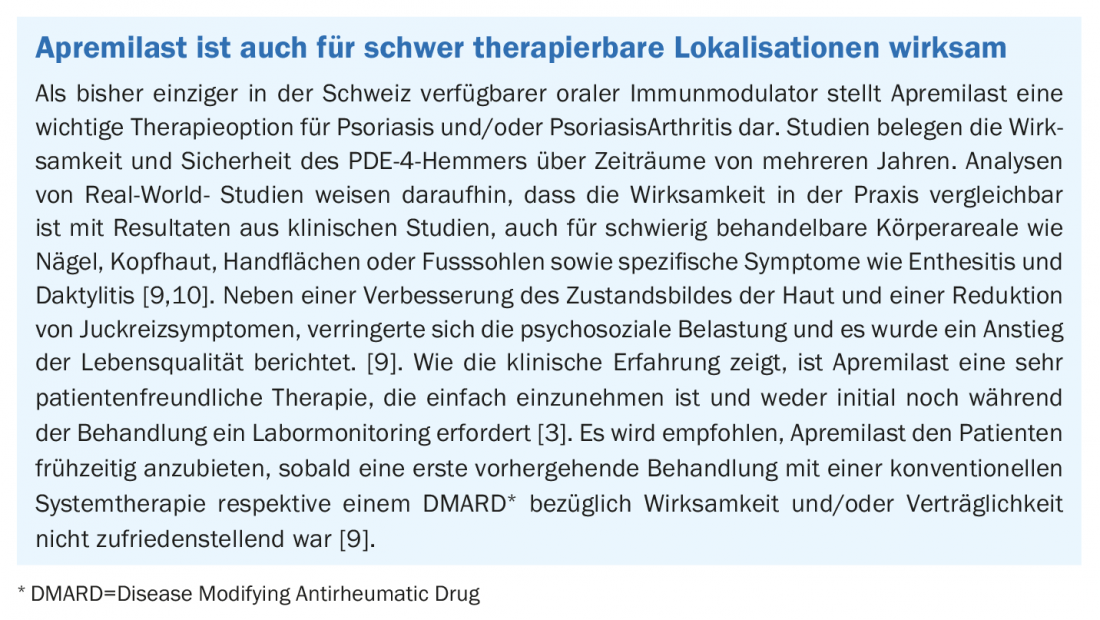The oral PDE-4 inhibitor apremilast has been an established treatment option for moderate to severe chronic plaque psoriasis and psoriatic arthritis for several years. And in a phase IIb study published in 2020, topical application of roflumilast in patients with plaque psoriasis showed promising results.
Agents that inhibit phosphodiesterase-4 (PDE-4) lead to intracellular modulation of pro- and anti-inflammatory mediators, resulting in downregulation of the inflammatory response. More specifically, there is initially an increase in intracellular cAMP levels, which reduces the expression of cytokines such as TNF-α, interleukin (IL-)23 and IL-17, and other inflammatory mediators. Furthermore, cAMP also affects the concentration of anti-inflammatory cytokines such as IL-10 (increase in IL-10 levels).
Is roflumilast a future topical therapy option?
Study results published in the New England Journal of Medicine by the research team led by Mark G. Lebwohl, M.D., of the Icahn School of Medicine at Mount Sinai in New York City, are promising [1,2]. In the three-arm randomized double-blind study, a total of 331 adult patients with plaque psoriasis received either Roflumilast 0.3% or 0.15% cream or a cream without active ingredient once daily. After six weeks of local therapy, 28% and 23% of the study participants in the two roflumilast groups, respectively, achieved an appearance-free or nearly appearance-free skin appearance (IGA score of 0 or 1), whereas under placebo this proportion was 8%. Roflumilast also proved superior to placebo in terms of Psoriasis Area and Severity Index (PASI). At baseline, the PASI score in all three conditions was approximately 8. After six weeks of treatment, roflumilast in both potencies resulted in a reduction in the PASI score of approximately 50%; under placebo, this reduction was only 18%. There was no difference in the three study arms with regard to adverse events at the application site. Longer and larger studies are needed to further explore the durability and safety of Roflumilast local therapy in psoriasis.
Apremilast as a proven evidence-based treatment option
The selective PDE-4 inhibitor apremilast has been approved in Switzerland since 2015 for the treatment of moderate to severe psoriasis and active psoriatic arthritis [3]. To date, it is the only oral immunomodulator for these indications. Apremilast modulates various pro- and anti-inflammatory cytokines through intracellular inhibition of PDE-4, thus counteracting a systemic inflammatory response [4]. The LIBERATE study demonstrated the efficacy and safety of apremilast in biologic-naïve patients with moderate to severe psoriasis over a 104-week period (n=226) [5]. In addition to improvements in skin lesions, particularly around the scalp and nails, pruritus decreased and quality of life improved. Apremilast also proved effective and safe 104 weeks after baseline in patients who switched from etanercept to apremilast. 50.0-59%–59,2% of all study participants achieved a ScPGA (Scalp Psoriasis Physician’s Global Assessment) of 0 (lesion-free) or 1 (nearly lesion-free). The mean change in pruritus according to the VAS (visual analog scale) was -24.4 to -32.3. The mean change in NAPSI (Nail Psoriasis Severity Index) since baseline was -48.1% to -51.1%. A Dermatology Life Quality Index (DLQI) score ≤5 was achieved by 66.0-72.5% of participants. An improvement in quality of life has a positive influence on therapy adherence, which has a favorable effect on the course of treatment. The frequency of adverse events did not increase with increasing duration of apremilast treatment [5]. A positive conclusion with the use of the oral PDE4 inhibitor over a period of up to three years is available from a slightly earlier published study by Crowley et al. to be taken from [6]. Overall, these study results confirm the results of the Phase III multicenter ESTEEM 1 and ESTEEM 2 studies, which demonstrated the efficacy and safety of apremilast over a 52-week period [7,8].
In summary, apremilast, as part of monotherapy or in combination, is a valuable treatment option for psoriasis sufferers with or without joint involvement, according to an expert statement published in 2019 by leading Swiss dermatologists [9].
Literature:
- Lebwohl MG, et al: Trial of Roflumilast Cream for Chronic Plaque Psoriasis. N Engl J Med 2020; 383: 229-239.
- Siebenand S: Psoriasis study. Roflumilast cream is convincing for psoriasis. Pharmaceutical Newspaper (Online), 23.07.2020, www.pharmazeutische-zeitung.de
- Technical information Otezla® (apremilast). www.swissmedicinfo.ch, (last accessed, 02/17/2021)
- Pincelli C, et al: Mechanisms Underlying the Clinical Effects of Apremilast for Psoriasis. J Drugs Dermatol 2018; 17(8): 835-840.
- Reich K, et al: Safety and efficacy of apremilast through 104 weeks in patients with mode-rate to severe psoriasis who continued on apremilast or switched from etanercept treatment: findings from the LIBERATE study. J Eur Acad Dermatol Venereol 2018; 32(3): 397-402.
- Crowley J, et al: Long-term safety and tolerability of apremilast in patients with psoriasis: Pooled safety analysis for ≥156 weeks from 2 phase 3, randomized, controlled trials (ESTEEM 1 and 2). J Am Acad Dermatol 2017; 77(2): 310-317.e1.
- Papp K, et al: Apremilast, an oral phosphodiesterase 4 (PDE4) inhibitor, in patients with moderate to severe plaque psoriasis: results of a phase III, randomized, controlled trial (Efficacy and Safety Trial Evaluating the Effects of Apremilast in Psoriasis [ESTEEM 1]). J Am Acad Dermatol 2015; 73: 37-49.
- Paul C, et al: Efficacy and safety of apremilast, an oral phosphodiesterase 4 inhibitor, in patients with moderate to severe plaque psoriasis over 52 weeks: a phase III, randomized, controlled trial (ESTEEM 2). Br J Dermatol 2015; 173: 1387-1399.
- Conrad C, et al: Proven efficacy for apremilast immediately after initial systemic therapy for psoriasis and psoriatic arthritis. http://rheuma-schweiz.ch/fileadmin/media/images/Weekly/01-04-2019/Expertenstatement_zu_Apremilast_Otezla.pdf
- Wollenhaupt J, et al. Presented at the 45th Congress of the German Society of Rheumatology (DGRh): 6-9 September 2017: Stuttgart, Germany.
DERMATOLOGY PRACTICE 2021; 31(1): 24












